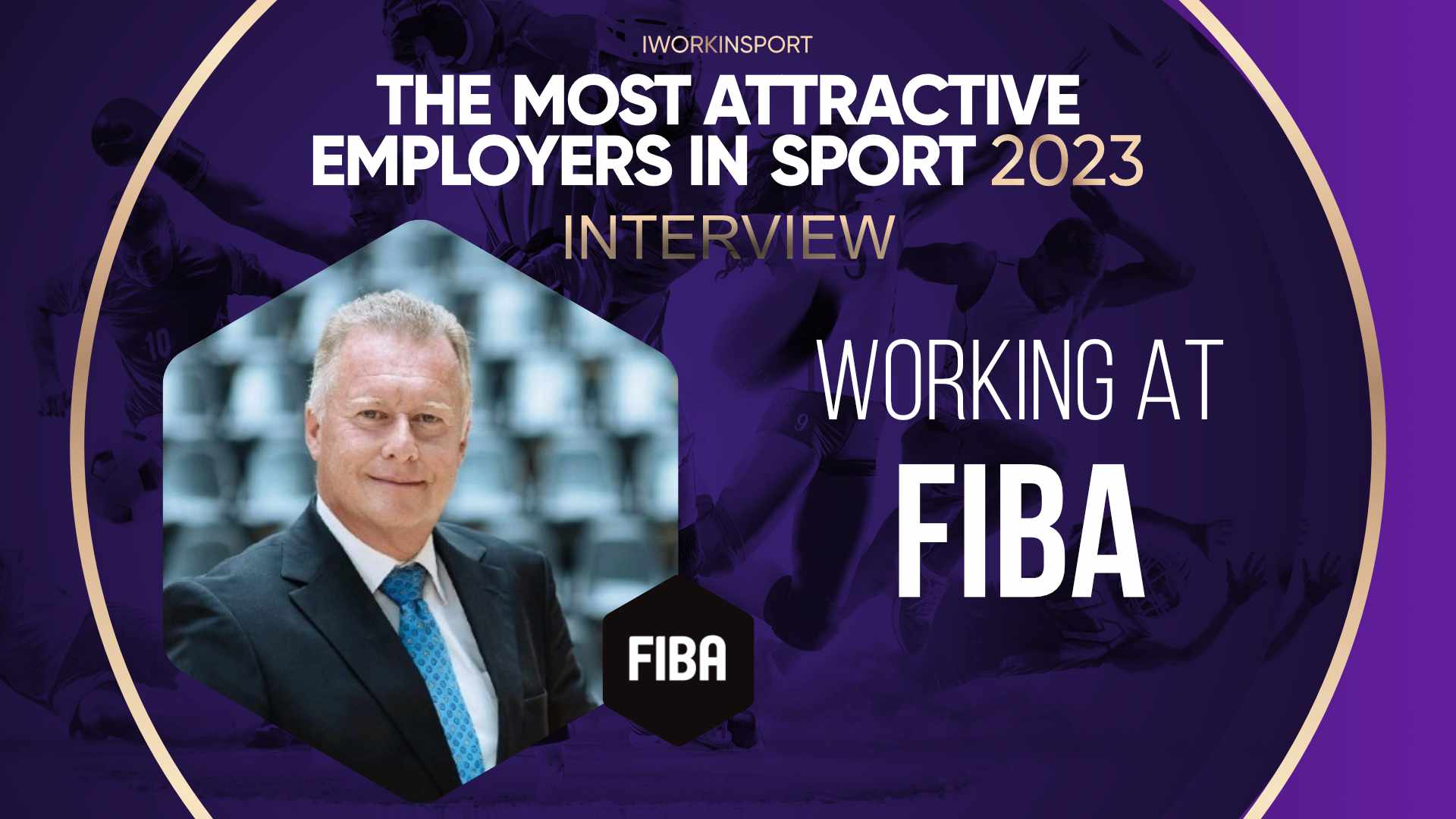Didier Rossi is the Global Head of Human Resources at FIBA. The International Basketball Federation was named earlier this year one of the Most Attractive Employers in Sport by a report published by iWorkinSport. This is one of five interviews with top recruiters in the industry featured in the publication.
The study surveyed more than 1,500 people from all continents, with the majority already working in sport, and asked them a simple question: “If you could choose to work anywhere in sport, where would that be?”
Initially, the respondents chose organisations divided into ten categories, and at the end, they indicated one single preferred choice, overall – the “Employer of their Dreams”.
The publication features rankings of the most attractive employers in sport divided in the following categories: Football Clubs, Sports Teams (other than Football), Sports Teams in the USA, Sports Leagues, Sports Governing Bodies, Event Organisers, Sports Marketing Agencies, Sponsors, Sporting Goods Companies and Sports Tech.
Additionally, the report presents the aspects that candidates rate as most important when deciding where they would like to work.
DOWNLOAD THE FULL REPORT HERE.
FIBA has been a top employer in the MAES Survey for multiple years now. Why do you think it consistently finds itself so highly ranked?
There are numerous reasons why working for FIBA is highly desirable. Firstly, our passion and dedication towards the sport is a key factor. Moreover, we foster an inclusive culture that values diversity and encourages collaboration, offering plenty of opportunities for professional growth and advancement through various programs. FIBA also prioritises the well-being of its employees by providing competitive compensation packages, comprehensive training and development programs, and a positive work environment. Additionally, working at FIBA is intellectually stimulating and impactful as employees contribute towards the global development of basketball. Our headquarters offers a diverse workforce of 43 different nationalities, confirming FIBA's esteemed position as the global governing body for basketball and a highly sought-after employer.
Our research shows that FIBA does well at attracting talent. What strategies do you have in place to ensure you retain your best talent?
As an organisation, FIBA offers various roles across many departments from Administration, Finance, HR to sports-related ones like Event Management, Sport and National Federations Development or Equipment and Venue Centre. We also have several Entities in the group: FIBA itself, the Foundation, the Basketball Champions League, FIBA Media and Marketing Services, etc. and we are present across 5 regional offices in Africa, Americas, Asia, Europe and Oceania. As a result, our employees can gain valuable experience, develop new skills, and grow professionally within the whole organisation. To retain our top talents, we employ various strategies. Our compensation packages and benefits, opportunities for professional growth and FIBA’s positive work environment, which encourages open communication, collaboration, and recognizing achievements, all help to ensure we are retaining our talented staff. Additionally, FIBA emphasises employee engagement through regular feedback, performance evaluations, and recognition programs. Furthermore, the organisation strives to create a diverse and inclusive culture, appreciating different perspectives and creating a sense of belonging. Finally, the significant contributions made by FIBA in the basketball industry, along with its global exposure and prestige, positively impact employee satisfaction and motivation, leading to improved retention rates.
Employee desires and needs are changing. Can you speak to the changing trends you are seeing, and how is FIBA evolving its HR strategies to address these needs?
After COVID, we have seen a growing emphasis on work-life balance, flexibility in work arrangements (such as implementing remote work options), career development opportunities, and a sense of purpose in the workplace. To address these changing needs, our HR strategies focus on implementing flexible work policies (including sabbaticals or joining Foundations development projects), providing opportunities for skill development and career progression (employee exchange programs between regions), fostering a positive and inclusive work culture, offering competitive compensation and benefits packages, and promoting work-life integration (possibility to buy additional vacation days). We also prioritise employee well-being initiatives, providing regular feedback and recognition, and aligning employees' work with the organisation's mission and values. We are also leveraging technology to streamline HR processes and enhance employee experience. All these initiatives are evaluated yearly through an anonymous Employee survey, to ensure that our total eNPS and engagement scores are well above the benchmark and are capable of further growth.
The sports industry has become an extremely appealing career choice. As the industry continues to professionalise, what advice do you have to offer those trying to break into the industry?
Having a genuine passion and dedication for sports can set you apart in a competitive sports industry. Show your eagerness to learn and grow within the industry to further demonstrate your commitment. Pursuing a degree or certification related to sports management can enhance your credentials and understanding of the industry. Then gaining experience through internships, volunteer work, or part-time roles with sports organisations to gain industry exposure is a positive. Developing further expertise by specialising in a specific area within the sports industry, such as marketing, event management, digital technology or sports law for instance, to build valuable skills and knowledge will help further. Speaking different languages is also a plus. Network as much as you can by attending industry events, join a professional association and connect with professionals in the field to stay updated on the trends and identify opportunities. Be aware that breaking into the sports industry can be competitive, so perseverance is key. If you’re coming from another industry, showcase transferable skills from other industries, such as teamwork, leadership, communication, and problem-solving, that are relevant to the sports industry.


